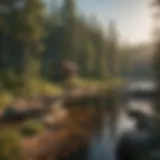Exploring Camp Kiowa: Heritage and Conservation Impact
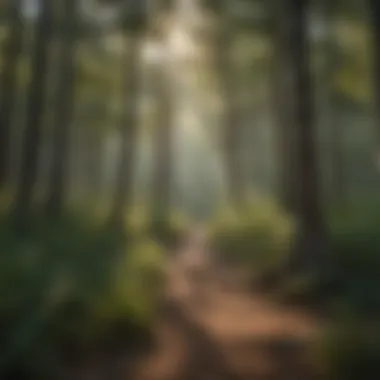

Intro
Nestled within the embrace of towering conifers and lush underbrush lies Camp Kiowa, a sanctuary not only for outdoor enthusiasts but also for those passionate about conservation. This retreat has woven itself into the very fabric of American environmental stewardship, creating a harmonious blend of recreation and respect for nature. As we explore the rich heritage of Camp Kiowa, it becomes apparent that this place has become synonymous with fostering a profound awareness of our ecological responsibilities.
In the upcoming sections, we will delve into the various evergreen tree species that populate this region, illuminating their ecological significance and examining the conservation practices vital for their preservation. Furthermore, we will dissect forest management techniques that serve to safeguard wildlife habitats, explore sustainable logging practices, and implement fire prevention measures vital for the health of these ecosystems.
As climate change continues its relentless tug on our natural world, it is paramount to investigate its impacts on evergreen forests. From the essential carbon sequestration these trees provide to how shifts in weather patterns disrupt their ecosystems, understanding these elements is crucial for future conservation efforts.
The exploration of this camp also brings to light the historical context of evergreen forests, showcasing ongoing research findings and conservation initiatives with successful outcomes.
Lastly, we will discuss outdoor activities accessible in these beautiful forests, ranging from hiking to birdwatching, ultimately enriching our experience of the natural world. Each aspect of this journey underscores the profound relationship between enjoying nature and preserving it for generations to come.
Let's embark on this exploration, setting our sights on the majestic evergreen trees that define not only Camp Kiowa but also the broader tapestry of America’s forestry heritage.
Historical Overview of Camp Kiowa
Understanding the historical context of Camp Kiowa is like peeling back the many layers of an onion – each layer tells a story of its own. This section explores the camp's foundation and its unfolding journey, providing insights into its role in conservation and community engagement.
Founding and Early Days
Camp Kiowa was established in the early 1960s, born out of a vision to create a space where nature and education could intermingle. Nestled in the wooded landscapes typical of North America, this camp was designed not just for recreation but also for fostering a strong connection with the environment. It served as a refuge for youth, emphasizing the importance of the natural world, away from the hustle and bustle of city life.
The camp's inaugural year saw a modest number of campers, all of whom were enticed by the promise of outdoor activities, learning about flora and fauna, and developing survival skills. The founders believed that instilling a love for the outdoors in young people would equip them to become stewards of nature.
Moreover, during those early days, the camp functioned as a testing ground for new ideas in environmental education, pushing the boundaries of conventional outdoor programs. It pioneered efforts to integrate hands-on learning experiences, allowing participants to immerse themselves in the beauty of their surroundings.
Evolution over the Years
Over the decades, Camp Kiowa has undergone transformations that reflect broader societal changes and an evolving understanding of conservation. In the late 1970s, as environmental awareness gained momentum, the camp expanded its programs, incorporating more rigorous educational components and a focus on sustainability. This shift didn't happen overnight; it was the result of responsive adjustments based on participant feedback and scientific advancements in ecology.
The introduction of specialized workshops and themed weekends brought a new twist to the camp's offerings. Topics ranged from biodiversity to climate change, adapting to the pressing issues of the time. With each passing year, the camp tightened its hold on the idea that educating young people about the environment was imperative to fostering a conscientious society.
"In the heart of nature, we find the roots of our accountability."
Today, as Camp Kiowa continues to thrive, it stands as a testament to resilient community-focused efforts in environmental conservation. Its journey reflects not only the growth of a camp but also the growing urgency surrounding conservation initiatives. The camp has built strong partnerships with various environmental organizations and educational institutions, turning it into a hub for collaborative conservation efforts.
In summary, the evolution of Camp Kiowa is not just about buildings and facilities; it's a story about ideas, the dedication of its leaders, and the many lives it has touched. As we look ahead, understanding this rich history becomes crucial in appreciating its commitment to conservation and community engagement.
Ecological Significance of the Camp
Camp Kiowa serves as a vital enclave for understanding the subtle yet profound relationships that exist within ecosystems. Its rich biodiversity and ecological attributes not only contribute to the preservation of natural habitats but also act as a living laboratory for environmental study. The camp highlights how well-managed outdoor spaces can serve as crucial components in conservation efforts, balancing recreation with ecological integrity. In today’s fast-paced world, such spaces are more important than ever for fostering an appreciation of nature and the necessity of protecting it.
Diverse Flora and Fauna
One of the most compelling aspects of Camp Kiowa is the incredible variety of plants and animals that inhabit its grounds. This diversity is not merely decorative; it plays an essential role in maintaining the balance of the local ecosystem.
The camp boasts species ranging from towering oak trees to delicate wildflowers, each contributing uniquely to the environment. The presence of migratory birds, amphibians, and other wildlife showcases the camp's role as a sanctuary for both local and transient species. Often, the interconnected web of life observed here reflects broader ecological trends, serving as an indicator of environmental health.
Moreover, this biodiversity creates a dynamic tapestry of interactions. For example, the relationship between pollinators like bees and flowering plants exemplifies symbiosis, where both parties benefit. Not only does this enrich the camp aesthetically, but it also enhances its ecological value. However, while the benefits of such diversity are clear, maintaining it requires continued efforts in habitat protection and restoration throughout the surrounding areas.
Habitat Preservation Efforts
Conservation at Camp Kiowa is neither an accident nor a byproduct of recreational activities; it is a conscious, ongoing effort deeply embedded in the camp’s mission. The dedicated efforts toward habitat preservation are multifaceted and strategically targeted.
Firstly, the camp carries out thorough assessments of its natural features. Detailed mapping of flora and fauna is routine, allowing for informed decisions about land management and conservation tactics. Then, invasive species management becomes a prime focus. By keeping invasive plant species in check, Camp Kiowa aims to protect native species that are integral to the ecosystem's health.
Additionally, educational initiatives target visitors, raising awareness about the importance of habitats and their preservation. Programs designed to inform campers about responsible practices help solidify a culture of conservation. When visitors learn the implications of their actions on local wildlife, they’re more likely to take steps to mitigate potential harm.
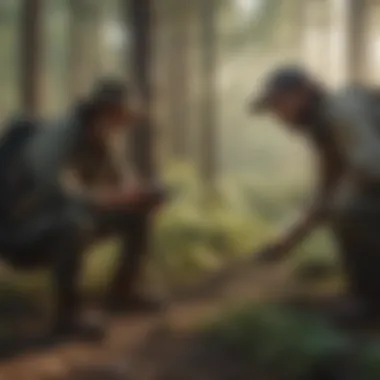

"A well-informed visitor is a more responsible one. Education is at the heart of conservation strategies."
Camp Programs and Initiatives
Camp Kiowa serves as a beacon of awareness about the intricate relationship between human recreational activities and the environment. This section delves into the camp's various programs and initiatives that are not merely functional but also vital for instilling a sense of responsibility and stewardship towards nature in every visitor. By offering diverse experiences and educational opportunities, Camp Kiowa plays a critical role in shaping environmentally conscious individuals.
Environmental Education Programs
One of the cornerstones of Camp Kiowa's mission is its Environmental Education Programs. These initiatives are crafted to enlighten participants about local ecosystems, sustainability practices, and conservation strategies. Through hands-on experiences, campers learn to appreciate the delicate balance of nature, which often goes unnoticed in daily life.
Engaging in workshops, nature hikes, and interactive sessions, participants gain practical knowledge about:
- Biodiversity: Understanding the diverse species that inhabit the camp and their roles within the ecosystem.
- Ecosystem Services: Recognizing the benefits nature provides, such as clean air, water purification, and pollination.
- Sustainable Practices: Learning how to adopt behaviors that minimize their environmental footprint.
These experiences foster a deep-rooted appreciation for nature, ensuring that campers leave with knowledge that transcends their stay at Camp Kiowa.
"Education is not the learning of facts, but the training of the mind to think." – Albert Einstein
Recycling and Sustainability Initiatives
Another significant aspect of Camp Kiowa's dedication to the environment is its Recycling and Sustainability Initiatives. These programs reflect a commitment to reducing waste and promoting a circular economy, a concept that is increasingly essential in our consumption-driven society.
Camp Kiowa implements practical strategies in its operations that resonate with the principles of sustainability:
- Recycling Stations: Various easily accessible bins for paper, plastic, and metals are stationed throughout the camp, encouraging visitors to recycle effectively.
- Composting Programs: Organic waste is transformed into nutrient-rich compost, which is then utilized in the camp’s gardens, demonstrating a hands-on application of recycling principles.
- Sustainable Supply Chain: The camp prioritizes environmentally friendly products, from biodegradable soap to locally sourced food, reducing its overall ecological footprint.
The effectiveness of these initiatives hinges on encouraging every individual—from campers to staff—to adopt sustainable habits and consider the environmental impact of their choices.
Through these programs, Camp Kiowa not only prompts immediate action but also plants the seeds of long-term environmental stewardship in young minds.
Recreational Activities at Camp Kiowa
At Camp Kiowa, recreational activities serve as a vital platform connecting visitors to nature while promoting conservation ethics. These activities not only provide an escape from the daily grind but also imbue individuals with a respect for the forest itself. Engaging with the various recreational options available fosters an appreciation of biodiversity and the importance of preserving natural ecosystems.
Camping and Hiking Experiences
Camping at Camp Kiowa offers more than just a place to pitch your tent; it’s an invitation to immerse oneself in the tranquility of nature. With several campgrounds nestled within lush greenery, visitors can choose between secluded spots or locations that allow for a more communal experience. The air is punctuated with sounds of rustling leaves and the calls of birds, creating a soundtrack that whispers the serenity of wilderness.
Hiking trails vary in difficulty and length, accommodating both novice walkers and seasoned trekkers. The Kiowa Trail meanders through different biomes, showcasing diverse flora such as towering pines and blooming wildflowers. Hiking not only promotes physical well-being but also offers a chance to connect with the ecosystem on a deeper level.
Visitors often report a sense of refreshment after a day spent navigating these paths, revealing how nature cleanses the spirit as much as the air. When embarking on these trails, always remember to follow the principles of Leave No Trace, ensuring that the beauty of this spot remains undisturbed for future generations.
"The best-kept secret at Camp Kiowa isn't just the scenic views, it's the solitude found while wandering its trails. Each step draws you deeper into nature's embrace, reminding you of your place in the ecosystem."
Wildlife Observation Opportunities
Wildlife observation presents a unique chance to witness the vibrancy of life that flourishes within the Camp Kiowa ecosystem. Equipped with a pair of binoculars and a hearty dose of patience, enthusiasts can encounter an array of creatures ranging from playful squirrels to majestic deer. Observing these animals in their natural habitats allows visitors to appreciate their behaviors and the delicate balance of nature firsthand.
Camp Kiowa is strategically located within migratory paths, making it an ideal spot for birdwatching during seasonal transitions. Participants can enjoy spotting a variety of birds that call the camp home, including vibrant warblers and elusive woodpeckers. Guided tours often include insights about these species and the role they play in the surrounding environment.
Understanding wildlife also goes hand-in-hand with learning about conservation challenges. As one observes wildlife, it’s essential to engage in thoughtful discussions about their habitats and how changes in the environment—whether natural or man-made—impact their lives. This awareness creates a foundation for informed advocacy, making visitors more passionate about conservation efforts.
Through camping, hiking, and wildlife observation, Camp Kiowa encapsulates a holistic approach to recreation that harmonizes enjoyment with education. Individuals are not merely visitors; they become participants in a broader conversation about environmental sustainability and respectful coexistence with nature.
Partnerships and Collaborations
Partnerships and collaborations are the backbone of Camp Kiowa. They stretch beyond mere affiliations and weave a fabric of communal effort that supports both conservation and recreation. These alliances, whether with local environmental organizations or educational institutions, play a pivotal role in broadening the camp's outreach and effectiveness. By pooling resources and expertise, Camp Kiowa can amplify its mission, enhance its programs, and drive impactful initiatives.
Furthermore, through these ties, Camp Kiowa embodies the essence of collective wisdom and shared stewardship for natural resources. Each co-partner brings unique skills and perspectives, creating a robust ecosystem of support. This collaborative spirit not only enriches the camp’s programs but also fosters a sense of unity among diverse stakeholders, essential for sustainable conservation efforts.
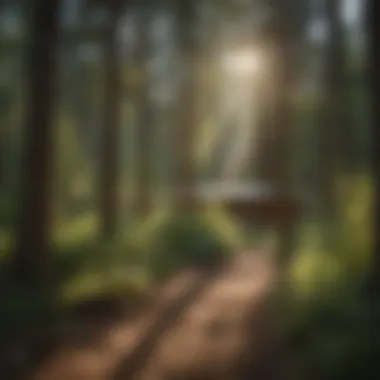

Local Environmental Organizations
Local environmental organizations serve as crucial allies for Camp Kiowa. Their unwavering commitment to protecting the natural landscapes that surround the camp aligns seamlessly with its conservation objectives. Groups such as the Cedar Falls Conservation Alliance and the Green Earth Initiative work hand in glove with Camp Kiowa to not only educate the community but also to engage in critical habitat restoration projects.
These partnerships lead to tangible benefits, including:
- Resource Sharing: Access to a greater pool of materials, whether they be educational tools or volunteer manpower.
- Event Collaboration: Hosting joint events that foster community involvement and awareness about local ecosystems.
- Expert Guidance: Valuable insights from seasoned professionals on environmental science and sustainable practices.
One exemplary project facilitated by such organizations was the Wetlands Restoration Initiative, where volunteers from both Camp Kiowa and local groups came together to restore vital wetland habitats. This effort not only emphasized the connection between conservation and recreation but also served as a learning platform for all involved.
Educational Institutions Involvement
Educators from local schools and universities often engage with Camp Kiowa, giving rise to a fruitful partnership that benefits students and the camp alike. Collaborating with educational institutions, such as Springdale Community College and Riverview University, aids in developing innovative programs that bridge the gap between academic theory and practical field application.
The involvement of these institutions fosters:
- Research Opportunities: Conducting studies that delve into local ecology, which can influence conservation strategies.
- Internship and Volunteer Programs: Students gain hands-on experience while the camp benefits from their fresh perspectives and energy.
- Workshops and Seminars: Organized sessions available for campers that cover various topics from sustainable forestry to wildlife biology.
An example of this collaboration in action is the annual Youth Environmental Leadership Summit, where students engage in discussions about pressing ecological issues and conservation tactics. This event serves as a platform, not just for learning, but also for forging bonds that last well beyond the confines of Camp Kiowa.
"It is through these partnerships that Camp Kiowa truly comes alive, fostering a community that values its natural surroundings while preparing the next generation of environmental stewards."
Such alliances are instrumental, enriching Camp Kiowa’s mission and amplifying its impact on conservation advocacy.
Challenges Faced by Camp Kiowa
Camp Kiowa is not just a retreat into the wilderness; it embodies a commitment to conservation and environmental education. However, this commitment does not come without hurdles. Understanding the challenges it faces is crucial for both its preservation and its ongoing mission to promote sustainable practices. This section dives into the pressing issues that Camp Kiowa grapples with, casting light on the complexities involved in maintaining such a valuable ecological and recreational resource.
Environmental Degradation Concerns
The natural beauty of Camp Kiowa is at the heart of its appeal. Yet, this beauty often masks a troubling truth: environmental degradation poses a significant threat. The camp is situated in a region vulnerable to various forms of ecological harm.
- Erosion Issues: Increased foot traffic from recreational activities can lead to soil erosion. Water runoff not only reshapes the landscape but also contributes to sedimentation in nearby water bodies, threatening aquatic ecosystems.
- Invasive Species: Non-native plants and animals can disrupt the delicate balance of local biodiversity. Species that find their way into the camp can outcompete native flora and fauna, compromising their survival.
- Climate Change Effects: Changes in weather patterns can alter the habitat significantly. This might mean shorter growing seasons for native plants or more frequent and severe weather events that challenge the camp's sustainability efforts.
Understanding these degradation issues is essential for Camp Kiowa to adapt its conservation strategies effectively. Fostering awareness among visitors about the environment can mitigate some of these negative impacts, allowing nature to reign strong within the camp's boundaries.
Funding and Resource Limitations
Even noble intentions and commitment cannot thrive without proper funding. While Camp Kiowa enjoys some support, resource limitations present a significant obstacle in fulfilling its mission. Financial constraints make it challenging to implement all desired conservation measures and keep up with necessary maintenance.
- Budget Shortages: The camp often operates on a shoestring budget, which limits its ability to conduct extensive ecological research or community outreach programs. Without adequate funding, prioritizing initiatives becomes difficult.
- Reliance on Grants and Donations: Many conservation projects rely heavily on grants and donations. This can create instability, as funding may vary from year to year, impacting long-term projects. Some programs may find themselves in limbo while waiting for financial support.
- Personnel Challenges: Adequate staffing is critical for the successful operation of conservation initiatives. Limited funds affect the ability to hire specialists who can address both educational and ecological needs effectively.
The future of Camp Kiowa hinges on overcoming these funding hurdles. By strengthening partnerships with local businesses, educational institutions, and philanthropic organizations, the camp could improve its financial position and ensure that its valuable programs continue to flourish.
"Conservation is a community effort; without the community behind it, we risk losing what we’re trying to protect."
In summation, while Camp Kiowa embodies a legacy of environmental stewardship, it stands at a crossroads. Addressing the challenges of environmental degradation and funding constraints will require collective efforts and innovative solutions, ensuring that it remains a prime example of conservation in action. Equipping future generations to engage with these issues will only enhance the camp’s mission and significance.
The Role of Camp Kiowa in Conservation Advocacy
Camp Kiowa stands as a vital bastion for conservation advocacy within its region. It goes beyond just being a recreational area; it's a space where ecological awareness meets rigorous practices in forest and wildlife preservation. In an age where environmental challenges can seem daunting, the camp emerges as a beacon for sustainable practices and responsible engagement with nature. Using its platforms, it cultivates an ethos of stewardship among visitors, while directly addressing contemporary issues in ecology and forestry management.
Promoting Responsible Recreation
At the core of Camp Kiowa's advocacy efforts is the promotion of responsible recreation. Visitors are encouraged to engage with nature in a manner that respects its delicate balance. This isn't merely a suggestion; it's an integral part of the camp's mission.
Several practices and recreational guidelines are in place:
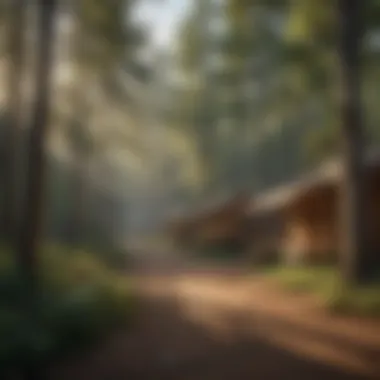

- Leave No Trace Principles: Camp Kiowa emphasizes the importance of the Leave No Trace principles which educate campers on minimizing their impact on the environment. Visitors learn to pack in, pack out, ensuring that they leave the area cleaner than they found it.
- Group Size Limitations: By setting limitations on group sizes for activities such as hiking and camping, Camp Kiowa helps mitigate overcrowding and soil erosion, fostering a more sustainable experience.
- Wildlife Interaction Guidelines: The camp endorses strict protocols regarding wildlife interaction, discouraging feeding or approaching animals. By educating guests on local fauna, it helps ensure that wildlife continues to thrive in their natural habitats.
Through educational workshops and outreach programs, Camp Kiowa instills the importance of making informed decisions about recreational activities among its visiting population. Every hike, canoe trip, and exploration is angled towards leaving a positive imprint on the ecosystem.
Advocacy for Sustainable Forestry Practices
Understanding the role of sustainable forestry is critical in combating issues like deforestation and habitat degradation. Camp Kiowa actively participates in advocacy surrounding these practices, aligning its camping experiences with broader ecological goals.
Key initiatives include:
- Collaborative Research with Local Universities: Camp Kiowa partners with academic institutions to study and promote sustainable timber harvesting methods. These collaborative efforts often result in new practices that can be shared with the forest industry, ensuring that economic interests do not override ecological balance.
- Workshops on Sustainable Practices: Regular workshops aim to educate campers about the significance of sustainable forestry, including methods like selective logging and reforestation. Therefore, participants walk away not only with memories but also with knowledge that may influence their future decisions regarding forest use.
- Sponsorship of Community Initiatives: The camp frequently sponsors local initiatives that focus on forest health and regeneration. Engaging the community helps build a collective responsibility towards conservation, reinforcing the idea that sustainable forestry is everyone's concern.
"The fight for conservation is a continuous one. Camp Kiowa serves as a pivotal platform for education, awareness, and action, ensuring that visitors leave with not only memories but a commitment to stewardship of our forests."
Through these diverse channels, Camp Kiowa lays the groundwork for a future where responsible recreation and sound forestry practices coexist. It recognizes that the challenges facing our natural environment require not just expertise but the active participation of informed and passionate individuals.
Visitor Experience at Camp Kiowa
When it comes to the seamless blend of recreation and conservation, the visitor experience at Camp Kiowa stands as a cornerstone of its mission. This camp is not just a location; it’s a living museum of nature, educating individuals about the environment in a hands-on manner. Through carefully curated experiences, visitors gain insights into the flora and fauna that call the camp home, while also learning valuable lessons about sustainable practices. The enriching experiences provided by the camp encourage a deeper connection with nature, fostering a sense of stewardship among guests.
Accommodations and Facilities
Finding a suitable resting place during your stay at Camp Kiowa is as vital as the activities planned. The camp prides itself on its variety of accommodations, ranging from rustic cabins nestled among towering trees to more contemporary lodges that provide a touch of comfort amidst the wild. Each facility is designed to reflect its natural surroundings, featuring eco-friendly construction and amenities that minimize environmental impact.
The cabins themselves can host families and groups, providing enough space for shared experiences without sacrificing comfort. Notably, communal areas encourage social interaction, allowing campers to bond over shared meals and stories around the fire.
Also worth noting is the camp’s commitment to accessibility. Facilities are equipped to ensure that all individuals, regardless of mobility challenges, can enjoy the great outdoors to the fullest extent. Access ramps and adapted restrooms make nature more inclusive.
Guided Tours and Programs
Camp Kiowa offers an array of guided tours and programs designed to enhance the visitor experience through direct engagement with nature. These aren't just simple walks in the woods; they are structured learning opportunities led by knowledgeable guides who are passionate about conservation.
- Nature Walks: These walks focus on educating visitors about local ecosystems, highlighting distinguishing features of the area’s biodiversity while using engaging storytelling to make the information stick. Participants often leave with new insights into wildlife behavior or plant life.
- Workshops: Workshops on sustainable practices invite guests to roll up their sleeves. From tree planting sessions to wildlife tracking methods, these hands-on experiences foster a personal connection to the environment.
- Nighttime Explorations: An evening program might involve stargazing or nocturnal wildlife spotting, encouraging a different perspective of the camp under the moonlight.
- Special Events: Seasonal events often feature expert speakers, providing a deeper dive into timely issues related to conservation and climate change.
In essence, the tours and programs at Camp Kiowa bridge the gap between knowledge and experience, ensuring that every visitor heads home with not only pleasant memories but perhaps a greater understanding of their role in caring for the environment.
Future Directions for Camp Kiowa
As the environmental landscape continues to shift and adapt, the overarching theme of sustainability must guide the future paths of Camp Kiowa. With a rich history embedded in conservation, the camp has the unique opportunity to evolve further in its mission. Addressing future directions is not just a matter of expansion or improvement; it serves as a cornerstone for ensuring that Camp Kiowa remains relevant in promoting ecological values. By focusing on specific elements such as program expansion and community engagement, Camp Kiowa can enhance its impact while continuing to educate and inspire future generations.
Expansion of Programs and Facilities
One significant avenue for advancing Camp Kiowa's mission lies in the expansion of its programs and facilities. The demand for outdoor education and environmental awareness has never been higher. Increasing the scale and variety of educational offerings can effectively respond to this demand.
By introducing new workshops that tackle pressing issues like climate change and biodiversity loss, Camp Kiowa could position itself as a leader in environmental education. Furthermore, enhancing existing facilities with modern sustainable practices—like solar panels, rainwater harvesting systems, and eco-friendly cabins—can attract visitors keen on experiencing responsible tourism.
Some potential programs might include:
- Advanced Nature Workshops: These could dive into topics like advanced bird-watching, local plant identification, or even wildlife rehabilitation.
- Youth Camps Focused on Leadership: Introducing camps dedicated to empowering youth in conservation roles could nurture future advocates for the environment.
- Community Science Projects: Partnering with local universities and organizations to conduct research on local ecosystems adds a layer of active participation—encouraging attendees to contribute to the body of knowledge regarding regional ecology.
Such initiatives not only enrich the offerings of Camp Kiowa but also foster partnerships that enhance the camp's credibility and outreach.
Strengthening Community Engagement
Equally critical is the need for strengthening community engagement. Camp Kiowa has long been a bridge between nature and society, making its potential to engage diverse community stakeholders an essential element of its future.
Building stronger connections with local schools, environmental organizations, and even businesses can have far-reaching effects. By developing programs that include community voices, Camp Kiowa can create a diverse support network that amplifies its conservation efforts.
Considerations for enhancing community engagement could include:
- Local Volunteer Days: Organizing community clean-up or planting days can foster ownership and pride among residents.
- Awareness Campaigns: Using social media and local news outlets to highlight conservation efforts can engage a broader audience.
- Collaborative Events: Hosting eco-fair events that showcase local artisans and eco-friendly businesses allows the camp to connect with the community’s culture while promoting sustainability.
"A community that rallies around its natural heritage is one that will strive to protect and cherish it."
Collectively, these steps not only serve to uphold Camp Kiowa's historical heritage but also enliven its presence in the growing movement toward ecological stewardship.


